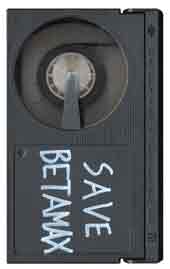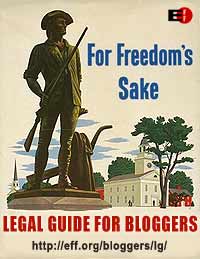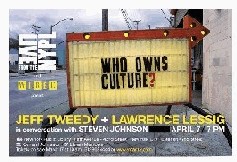 Why Save Betamax?
Why Save Betamax?
The short version: We're organizing a call-in day to Congress on September 14 to oppose new legislation that would undermine the Betamax decision (INDUCE Act). Sign up on the right.
Here's why: The Betamax VCR died more than 15 years ago, but the Supreme Court decision that made the Betamax and all other VCRs legal lived on. In Sony vs. Universal (known as the Betamax decision) the Court ruled that because VCRs have legitimate uses, the technology is legaleven if some people use it to copy movies. Of course, the movie industry was lucky it lost the case against VCRs, because home video soon became Hollywood's largest source of revenue. And the freedom to use and develop new technology that was protected by the Betamax decision set the stage for the incredible growth in computer technology we've seen in the last few decades.Más info en
www.savebetamax.org, una iniciativa que me llega a través de la
Electronic Frontier Foundation. Se trata de que los americanos hagan saber a sus congresistas que no quieren que sea aprobada una nueva sección del Copyright Act, conocida como "the Induce Act".
Este cambio supondría renunciar a lo conseguido con la famosa sentencia del caso Betamax, extendiendo la responsabilidad por infracción del copyright a las empresas que "inducen" a la infracción con sus productos (aunque estos productos, como el video del caso Betamax, tengan significativos usos legales). Bajo la amenaza de las legiones de abogados que mantienen Hollywood y la industria discográfica, las empresas tecnológicas se verían abocadas a pedir permiso a la
Industria para innovar.
Conclusiones:
Qué estúpidos y pesados los de la industria. Que buenos los de la EFF. Qué engrasado el sistema americano, con todas las fuerzas funcionando sobre el tablero. Ganará el futuro, ganará Betamax.

 Las licencias cretive commons explicadas muy fáSil en un bonito
Las licencias cretive commons explicadas muy fáSil en un bonito 
 La foto, bonito flyer para una conferencia. Una idea de
La foto, bonito flyer para una conferencia. Una idea de  Una magnífica (y ya vieja)
Una magnífica (y ya vieja)  Why Save Betamax?
Why Save Betamax? Ignacio Zafra, titula en El País del domingo, El festival de las descargas porno y el "pirateo" termina a toda máquina. Vaya, vaya, me pregunto
Ignacio Zafra, titula en El País del domingo, El festival de las descargas porno y el "pirateo" termina a toda máquina. Vaya, vaya, me pregunto